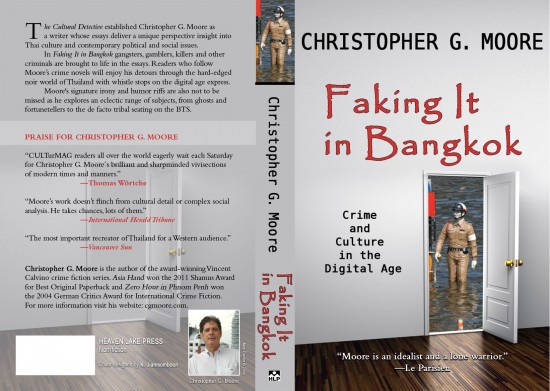 Der dritte und letzte Teil des von Christopher G. Moores „global crime“-Essay dreht sich um Zensur, ein tückisches Thema, weil es direkte und indirekte Zensur gibt.
Der dritte und letzte Teil des von Christopher G. Moores „global crime“-Essay dreht sich um Zensur, ein tückisches Thema, weil es direkte und indirekte Zensur gibt.
Dispatches from the frontline of Crime Fiction’s Extremistan – Part 3: Censorship
What controls Extremistan authors, what keeps them off the grid is an effective system of censorship backed by punitive laws. Unless you’ve lived outside of North America or Western Europe, you won’t have experienced the ‘eye’ of authorities (and their true believers or paid for shills) monitoring all communications, including books for possible breaches of national security or other equally vague, open-ended phrases designed to preserve an image. The broader the better for purposes of chilling the kind of expressions that question, criticize or challenge authority, institutions, dogma or beliefs.
The mere presence of a censorship regime induces self-censorship. Authors are never certain where the authorities will draw the line. Monday it is one place, Tuesday it has moved somewhere else and the week is only two days old. This makes sense as the authorities in charge of enforcement rarely speak with one voice as to where the boundaries of permissible and impermissible meet. To be on the careful side means authors error by staying as far away from the border as possible. As a result with speech stifled, the creativity writers in such regimes are given a couple of choices—either write hagiography, historical epics of glory or vacuous entertainments.
Alternatively, they can circulate their poems, stories, novels and memoirs under a pen name with photocopied handouts or, if they have access to a secure Internet line (that is difficult in most cases), have access to a computer, have the technical skills to use word processing programs, they can ‘publish’ their work on the Internet. We have seen the Internet being used to upload video footage from protests, repressive actions by military and police, and the aftermath of bombings and shootings.
It is time to recognize that ‘crime fiction’ and the reality of life upon which fiction emerges are no longer separate. The idea of ‘crime fiction’ as contained in a book needs broadening as well. Uploaded images from Extremistan communicate graphic, brutal noir stories as powerful and haunting as found in a crime novel by Hammett or Chandler.
For centuries censorship has largely been local. Each culture identifies the ‘sacred cows’ that can’t be touched. There hasn’t been agreement on a universal sacred cow and it is unlikely to be one any time soon. Going through the unmapped parts of Extremistan the ‘sacred cows’ are often quite different beast. What is common is that the guardians have used censorship to protect and defend the local herd (there are often a number of sacred cows as it turns out). The chief herdsmen use whatever force may be necessary to keep the herd in a stable state of unquestioned worship, respect, and awe.
Authors in Extremistan—at least the risk-taking ones—like to slip through the thought net cast by the authorities and raise questions about the grazing rights of sacred cows. That often ends in unpleasantness of the extreme kind.
Censorship is not going to stay confined to remote areas of Extremistan. Authorities are developing technology that will make censorship of the past as quaint, remote and inefficient as the quill and ink. In even the most impressive regimes, it has been possible for courageous men and women to challenge authority through books circulated underground. The old regimes are basically inefficient clap-trap machines that used flaw intelligence to repress free speech. That is about to change.
Here is what I see one possible future for authors living inside Extremistan.
First, the authorities in the West are developing the capability to monitor in detail large areas. Every person, vehicle, dog, bird to within a 6” radius can be clearly observed within a fifteen square mile corridor. Have a look at this chilling segment from the program Nova:
Second, the authorities are on the brim of creating powerful identification software that will allow them to identify every person on the ground, given name, age, nationality, associations, ID numbers, date of birth, known associates, medical health record, list of ‘likes on Facebook, articles read, books bought, consumer items purchased, school and university records. The ID system will run on fine-tuned algorithms as the amount of big data would vastly exceed an army of people filtering for signals. Authorities are end users of targeted information—they know who is where and when they are were in a place, and who are their friends and associates. Such information is incredibly powerful.
Third, the authorities are developing a new generation of drones. The censors’ goal is to cull the dissent within and without. A carrot is good. But a big stick is better. Why not adapt the existing drone technology? One limitation is controversial—drones fire rockets that blow up innocent children and women and old people leaves the authorities a bad reputation. Authorities seek ways to burnish their reputation and to reduce information that tarnishes it. That’s difficult to explain away when killing insurgents but quite another to explain for an enemy who is using only a pen. Technology continues to improve, and some projections as to what might be in store may increase the censors’ arsenal.
The chances are high that advanced drone technology systems will be created to eliminate the stigma of collateral damage. This requires surgical isolation of damage to a single target. With the new technology outlined above, finding that target will become infinitely easier. Moving targets will be not present a challenge. And it will be infinitely easier to persuade most would be dissenters that yielding to silence is the only alternative.
Let’s call the new drone Aerial Reconnaissance Sniper or ARS—which is also Hebrew slang for a low-class male. It turns out that in Arabic ars also is a term associated with:
• A pimp in general
• A cuckold, a man whose wife is unfaithful to him
• A man who pimps his wife
• A wicked or contemptible person, a “bad guy”
• A bastard, an illegitimate child
If there is any agreement in the Middle East, it is that ars is a term used for someone no one is going to mourn once he’s dead. Before ARS we called them terrorists. Language like technology evolves; in this case, in tandem.
The innovation of the new generation of ARS arms the drone at 17,000 feet to deliver with absolute precision a bullet to the, well, let’s be honest, what the authorities have concluded are a low-class male, a bad guy, who has through his conduct sacrificed his right to live. This “bullet” will be a tiny guided missile the size of a 50Cal round with video camera. The bullet guidance system locks on and tracks the target. You can run but you can’t hide. One less Ars the new reports will say. The video footage will confirm the kill. Call this elimination program an example of national security interest gone global.
The authorities in Extremistan will trade resources for those controlling ARS technology to take care of their local ‘bad guys’ who just so happen to be writing books that ridicule or challenge the role of sacred cows or put them in an unfavourable light.
We are the last of the free men and the last of the free women. Those who follow after us, if they read our books will marvel at how much freedom we had. Or maybe they won’t. In all those vast stretches of Extremistan where authors seek to put a message of hope in a bottle casting it into the sea of the future, and trusting it will wash up on some beach, will likely find the beach empty. People will no longer walk along such beaches. They no longer find such bottles and the messages hidden inside. The sacred cows roam will be left unmolested by writers. Words and images will extol the virtue of the authorities.
The fields and pastures belong to them and from 17,000 feet trespassers will find themselves in the cross-hair of ARS. There will be nowhere to hide. Freedom will be transformed in Arsdoom. And there will be no one left standing who is able to question the herdsmen as to why, how, and when that new global state came into being. In the future, our successors in the writing life will write and live in a version of North Korea?
Christopher G. Moore
Den ersten Teil des Essays finden Sie hier.
Dieser Text erschien am 11.4. 2013 auf unserer Partnerseite.
Christopher’s latest Vincent Calvino novel, 13th in the series, is titled Missing in Rangoon and is available as an ebook on Kindle.
Christopher C. Moore: The Wisdom of Beer.
Der Untreue-Index beim Unionsverlag. Bangkok Noir. The Cultural Detective. Kindle/Amazon. UK and Kindle/Amazon USA. Moores Podcast. Die Vincent Calvino-Romane. Der Autor beim Unionsverlag.
Zu Christopher G. Moores Website und zu Tobias Gohlis’ Rezension des Untreue Index bei arte.
Titelbild: Victor Bezrukov, wikimedia commons.












